
Hisham Sliti, is a citizen of Tunisia who was held in extrajudicial detention in the United States Guantanamo Bay detention camps, in Cuba. His Guantanamo Internment Serial Number is 174. The list of the names of all the Guantanamo detainees states that his date of birth was February 12, 1966, in Hamam Lif, Tunisia. He was transferred to Guantanamo on May 1, 2002, and held there for twelve and a half years. On November 20, 2014, Sliti and Hussein Salem Mohammed were granted asylum in Slovakia.

Bashir Nashir Ali Al-Marwalah is a Yemeni, who was captured in Pakistan, on September 11, 2002, and transferred to extrajudicial detention in the United States Guantanamo Bay detention camps, in Cuba. His Guantanamo Internment Serial Number is 837. Joint Task Force Guantanamo counter-terrorism analysts reports that Al-Marwalah was born on December 1, 1979, in Al-Haymah, Yemen.
Saeed Ahmed Mohammed Abdullah Sarem Jarabh is a citizen of Yemen who was held in extrajudicial detention for over fourteen years in the United States Guantanamo Bay Naval Base, in Cuba. Joint Task Force Guantanamo analysts estimate he was born in 1976 in Jeddah, Saudi Arabia.

Ahmed Abdul Qader is a citizen of Yemen, who was held in extrajudicial detention in the United States Guantanamo Bay detainment camps, in Cuba from June 18, 2002, to January 14, 2015. His detainee ID number was 690. The Department of Defense estimated that Qader was born in 1984, in Sana'a, Yemen.
Shawali Khan is a citizen of Afghanistan, who was held in extrajudicial detention in the United States Guantanamo Bay detainment camps, in Cuba. His Guantanamo Internment Serial Number was 899. American intelligence analysts estimate he was born in 1963, in Kandahar, Afghanistan.
Lotfi Bin Ali, also known as Abdullah Bin Ali al-Lutfi, was a Tunisian whom the United States held in extrajudicial detention for over thirteen years in the Guantanamo Bay detention camps, in Cuba. He was one of five men transferred to Kazakhstan in 2014. He was extensively quoted following the death, purportedly from lack of medical care, of one of the other captives transferred to Kazakhstan. In a September 2016 profile in The Guardian, he described exile in Kazakhstan as being very isolating, and, in some ways, almost as bad as Guantanamo.

Ghaleb Nassar Al Bihani is a citizen of Yemen formerly held in the United States Guantanamo Bay detainment camps, in Cuba. The Department of Defense estimate that he was born in 1979, in Tabuk, Saudi Arabia.

Mohammed Ahmad Said Al Edah is a citizen of Yemen who was held in the United States' Guantanamo Bay detainment camps, in Cuba, for fourteen and a half years. His Internment Serial Number is 33. Joint Task Force Guantanamo counter-terrorism analysts estimate he was born in 1962, in Hay al-Turbawi Ta'iz, Yemen.
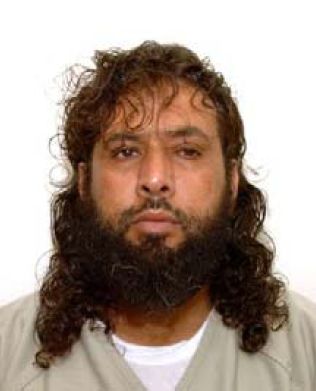
Omar Khalifa Mohammed Abu Bakr Mahjour Umar is a citizen of Libya who was held in extrajudicial detention in the United States' Guantanamo Bay detention camps, in Cuba, from August 5, 2002, until April 4, 2016. Abu Bakr's Guantanamo detainee ID number is 695. American intelligence analysts estimate that Abu Bakr was born in 1972 in Al Bayda [sic], Libya.
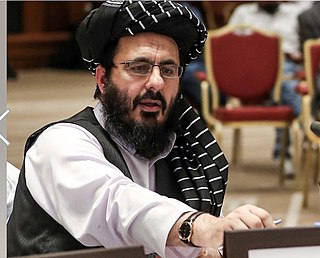
Mawlawi Mohammad Nabi Omari is an Afghan politician serving as First Deputy Minister for Interior Affairs under the internationally unrecognized Taliban regime since 6 October 2022. He was also appointed Acting Governor of Khost Province in late August 2021. Omari was held for nearly twelve years in extrajudicial detention at the United States Guantanamo Bay detainment camps, in Cuba. His Guantanamo Internment Serial Number was 832. American intelligence analysts estimate that he was born in 1968, in Khost, Afghanistan. He arrived at the Guantanamo detention camps on October 28, 2002.

Ridah Bin Saleh Bin Mabrouk Al Yazidi is a citizen of Tunisia who was held in extrajudicial detention in the United States Guantanamo Bay detainment camps, in Cuba since the day it opened, on January 11, 2002.

Mashur Abdallah Muqbil Ahmed Al Sabri is a citizen of Yemen who was held in extrajudicial detention in the United States Guantanamo Bay detainment camps, in Cuba until April 16, 2016. Al Sabri's Guantanamo detainee ID number is 324.
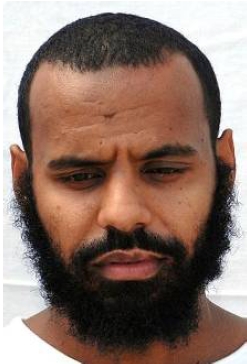
Salem Ahmed Hadi bin Kanad is a citizen of Yemen, who was held in extrajudicial detention in the United States Guantanamo Bay detainment camps, in Cuba. His detainee ID number is 131. Joint Task Force Guantanamo counter-terrorism analysts reports that Hadi was born on January 15, 1976, in Hadhramaut, Yemen.
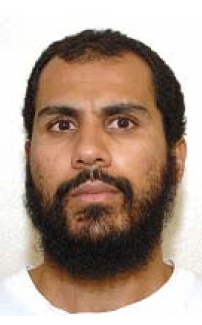
Zahar Omar Hamis Bin Hamdoun is a citizen of Yemen, held in extrajudicial detention in the United States Guantanamo Bay detainment camps, in Cuba. His Guantanamo Internment Serial Number is 576. The Department of Defense reports that he was born on November 13, 1979, in Ash-Shihr, Yemen.

Shawki Awad Balzuhair is a citizen of Yemen, held in extrajudicial detention in the United States Guantanamo Bay detainment camps, in Cuba.

Omar Said Salim Al Dayi, also known as Omar Said Salem Adayn and Omer Saeed Salem Al Daini, is held in extrajudicial detention in the United States Guantanamo Bay detention camps, in Cuba. His Guantanamo Internee Security Number is 549.

Abdul Latif Nasir is a Moroccan man formerly held in administrative detention in the United States Guantanamo Bay detention camps, in Cuba. His Guantanamo Internment Serial Number was 244. Joint Task Force Guantanamo counter-terrorism analysts report he was born on March 4, 1965, in Casablanca, Morocco. Abdul Latif Nasir and Sufyian Barhoumi tried to file emergency requests to be transferred from Guantanamo in the final days of Barack Obama's presidency.

Muhammed Murdi Issa Al Zahrani is a citizen of Saudi Arabia who was held in the United States's Guantanamo Bay detention camps, in Cuba from August 5, 2002, until November 22, 2014. His Guantanamo Internment Serial Number was 713. Joint Task Force Guantanamo counter-terrorism analysts estimate he was born in 1969, in Taif, Saudi Arabia.

Muktar Yahya Najee Al Warafi is a citizen of Yemen who was held in extrajudicial detention in the United States Guantanamo Bay detainment camps in Cuba. The Department of Defense estimate that Al Warafi was born in 1974, in Ta'iz, Yemen.
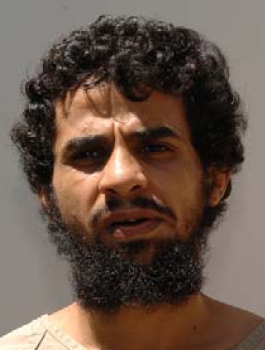
Mohammad Al Rahman Al Shumrani is a citizen of Saudi Arabia who was held in the United States Guantanamo Bay Naval Base, in Cuba. His Guantanamo Internment Serial Number was 195.
















